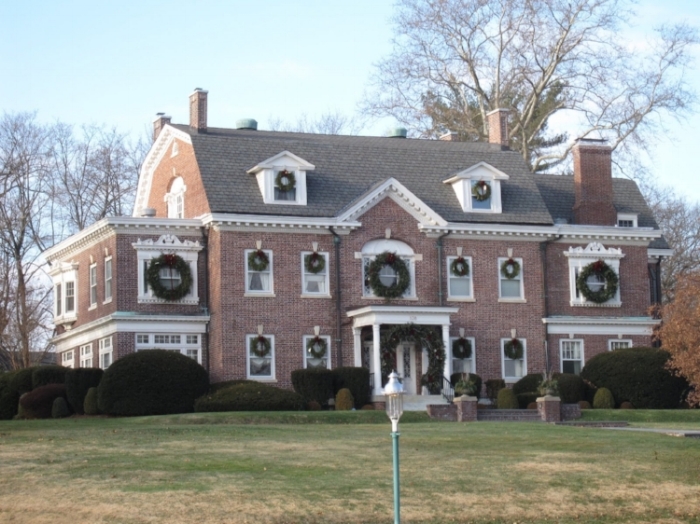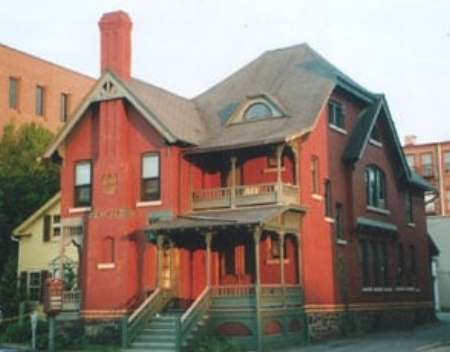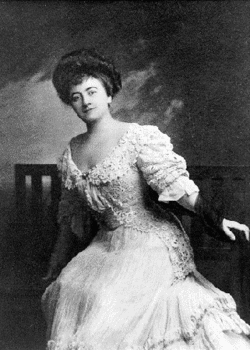Some First Class Homes of the First Class Passengers on the Titanic Part 3: East Coast to West
While my last two posts looked at the homes of the very rich and famous and urban sophisticates, in this one I will take a look at some of the other homes representing passengers from the East coast to the West. As I wrote in my first post in this series, the first class passengers on the Titanic were a mixed lot, representing a broad swath of the upper-middle and upper classes at the time. This was reflected in the style and scale of their respective homes, which embraced many of the styles of the time, from older traditional Queen Anne architecture to newer Arts and Crafts or Colonial Revival styles.
Arthur Webster Newell
Arthur Webster Newell, traveling on the Titanic with his two daughters, was a self-made man, and an American success story. He grew up in Boston under very modest circumstances, and began his business career as a clerk at a Bank. Through diligence and hard work he rose up through the ranks professionally, eventually moving his family to the affluent suburb of Lexington Massachusetts. A year before he became Chairman of the 4thNational Bank of Boston, he moved his family into this “modern” shingle style house there at 20 Percy Road.
Mr Newell perished in the sinking. His daughters survived.
Henry Blank with his wife, who did not accompany him on the Titanic
Henry Blank was a successful jeweler and the co-owner of a jewelry company located in Newark New Jersey. In 1907 He moved his family to Glenridge New Jersey, building a gambrel roofed, brick colonial revival mansion there.
It was known for its lavish interior decorative elements (no surprise perhaps, considering his trade). Returning to the States from a business trip, he survived the sinking.
The home still stands today.
Norman Campbell Chambers was a mechanical engineer from Ithaca, New York. He and his wife Bertha divided their time between a Queen Anne style family home on East Seneca street there,
East Seneca Street
and (at least according to several censuses around that time) at 111 Broadway in Manhattan, a recently constructed large modern office tower not known for containing apartments, though perhaps it did at the time.
111 Broadway
Gilbert tucker
Gilbert Tucker who came from a well-to-do Albany family decided to travel on the titanic in pursuit of a young lady he was smitten with. The Tuckers lived at 304 State St in this Richardsonian Romanesque-influenced townhouse.
304 State Street
While he survived the disaster, his budding romance did not, and he lived under the cloud of how he actually got into one of the lifeboats while so many others did not. He returned to Albany dejected and moved out to his family’s country place in nearby Glenmont.
He returned to Albany dejected and moved out to his family’s country place in nearby Glenmont.
Artur Larned Ryerson
Emily Borie Ryerson
Arthur Larned Ryerson (heir to a steel fortune) and his wife Emily came from Chicago, and had a home in Haverford on Philadelphia’s Main Line. Spiritually however, they considered Ringwood Manor, an arts and crafts style mansion they had built overlooking Otsego Lake near Cooperstown New York in 1901 to be their home.
They hurriedly booked passage on the Titanic upon learning of the death of their oldest son in automobile accident in Pennsylvania. Arthur died in the sinking. Emily, along with three of their children, their governess and her ladys maid all survived however.
Emily's Lakeshore drive home today
The living room during the era Emily lived there
A decade later she later commissioned David Adler to design a neo-federal style townhouse for her on Lakeshore Drive in Chicago, while continuing to summer at Ringwood manor.
Jean Hippach and her mother Ida
Also from Chicago was Ida Hippach Jean Hippach, traveling with her 18 year old daughter Jean. They lived in a comfortable home at 7360 Sheridan Drive on the North Shore, and were both well-known as fashionable and attractive women in social circles there.
They were also no strangers to tragedy. In 1903, two of Jean’s brothers perished in the notorious Iroquois Theatre fire nine years before. Fortunately, both women survived the sinking.
Caroline Bonnell, a thirty-year old woman traveling with several relatives in her party had been born in Chicago, the daughter of a successful iron and steel merchant. After her father’s death in 1884, Caroline moved to Youngstown Ohio where her mother’s family was from, occupying this multi-gabled Queen Anne style home there.
Among those traveling with Caroline was a cousin George Dennick Wick, his daughter Mary Natalie and his second wife Mary. George had also been in the iron business with Caroline’s father, and built this English-style mansion in Youngstown Ohio in 1906. George died in the sinking while his wife and daughter survived.
The home still stands, today as part of the campus of Youngstown State University and rumored to be haunted.
Mr. and Mrs. Dickinson Bishop were returning from a 4-month honeymoon trip to Dowigac Michigan. Though only twenty-five, Mr. Bishop had already been widowed once. His first wife, who had tragically died soon after their marriage, had him a majority stake in her family’s round Oak Stove Company in Dowigac, allowing him the means to build this handsome home there.
He and his second wife Helen (only 19 and pregnant at the time of the sinking) both survived, though tragedy continued to stalk them. Their baby born in September 1912 lived only two days and a fall in 1916 left Helen permanently impaired until her death in 1919.
Walter Douglas, a former executive with the Quaker Oats Company (co-founded by his father) had recently retired from active business and was returning with his second wife, the former Mahala Benedict, from a three-month shopping trip in Europe. They were buying furnishings for their recently constructed mansion overlooking Lake Minnnetonka near Minneapolis Minnesota. Walter perished in the sinking, his wife survived.
Their former home is still standing.
Georgette Madill
St Louis Newspapers took note of the extravagant $7500 per annum allotted by the probate court to Fifteen-year-old Georgette Madill of St Louis for clothing and spending money under the terms of her late father’s will. She was traveling with her mother, Mrs. Edward Robert (who had remarried after Judge Madill’s death) and her cousin Miss Elizabeth Allen. Mother and daughter lived in a brick hipped roof home built by her late father at 4140 Linden Avenue.
While its exterior appearance has been diminished by the commercialization of the neighborhood, a vintage photograph of its interior testifies to its onetime elegance.
A period photo if the Madill home's interior
Elizabeth Allen
Miss Allen had lived in a home built by her own father which later became the Union Club.
The former Allen residence on Grand Avenue (left)
Herbert Chaffee
Carrie Chaffee
Herbert Fuller Chaffee was born in Sharon Connecticut and later moved to Amenia, North Dakota in to help run his father’s business. Both the town and the company (the Amenia-Sharon Land Co.) were named by his father after familiar places back east. Eventually he became CEO of the company, which controlled 42,000 acres of farmland, and built this Queen Anne style “manor” house there.
Herbert died in the sinking, though his wife Carrie, traveling with him survived.
Dr. Washington Dodge, traveling with his wife and son, were prominent members of San Francisco society. They lived in this grand home on Laguna Avenue in San Francisco.
All three were saved.
Walter Miller Clark, born in Montana, was the nephew of Copper magnate Senator William Clark. He moved to Los Angeles with his family when he was a schoolboy, where his father became a railroad official, vice president of the Los Alamitos Sugar Company and president Los Angeles Chamber of Commerce. Walter was traveling with his wife, the former Virginia McDowell whom he had married in 1909.
The Clark residence on West Adams Street in Los Angeles
According to the 1910 census they were living at his parents home on West Adams Street as well as owning a house on nearby Severence Street. Walter died in the sinking, while Virginia surivived.














































